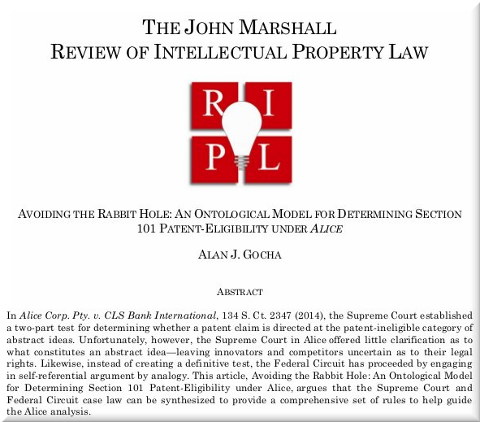

An Ontological Model for Determining Section 101 Patent Eligibility under Alice [PDF]
"Here we are at the end of 2017 and as we noted some days ago, the higher courts in the US (including the Federal Circuit) have effectively ended software patents."The patent microcosm, which got accustomed to making money from software patents, keeps moaning that abstract patents are rejected outright. Get used to it.
Rather than accept defeat and pursue something else, these stubborn people try to utilise and master new 'tricks'; they want to pursue software patents in spite of Alice, irrespective of what courts (with expert testimonies and other scrutinisers) may inevitably say.
DLA Piper LLP's Larissa Park has just published this article in which she insinuates that software can be patented. Not so constructive an advice...
"The patent microcosm, which got accustomed to making money from software patents, keeps moaning that abstract patents are rejected outright."Software is not patentable. It's no longer worth pursuing in the US. Want some software patents in spite of it? Then go to China...
Want to protect software developers from plagiarism? Then rely on copyright instead. It already does the job pretty well, for both proprietary and Free/libre software developers. Enforcement or compliance is accomplished differently, but it works. To quote Park:
If your product or service involves software, you should explore the possibility of filing for and obtaining a software patent. While copyright can protect your actual code from being copied; copyrights cannot prevent others from independently (i.e., without copying) developing the same software. On the other hand, a patent can permit you to exclude others from practicing the functional aspects of the software claimed in your patent, even if the other party independently developed the software. See our corresponding article on patents.
The federal government grants patents on new, useful and non-obvious inventions. While features and functions of your software may be new and non-obvious, the biggest hurdle to obtaining patent protection can be overcoming the useful requirement, that is, whether your new and nonobvious software is even eligible for a patent.
[...]
Software can be protected with copyright and trade secret. As noted above, copyright will protect you from someone copying your actual code. However, you will not be protected if that person independently develops his or her own code that performs similar functions. More details on copyright protection can be found in our corresponding blog post on copyrights. Trade secrets can protect the structure and methodology of your software, but will require you to implement confidentially procedures to keep the material secret. Once the information you are attempting to protect with a trade secret becomes public, it will no longer be protected by trade secret law. More details on trade secret protection can be found in our corresponding article on trade secrets.
"Since she and her colleagues rarely (if ever) claim to have developed software, perhaps the reality of it conveniently evades them."What's also absent (or lacking emphasis) in the article from Park is Alice. In the dawn of 2018 it makes absolutely no economic sense to invest in software patents; companies should, instead, form a strategy around copyrights (or copyleft). The world is changing and one must move on with the times...
The new journal article at the top is Alan Gocha’s paper on “Section 101 patent eligibility under Alice.” Patently-O mentioned it a few days ago and so did a few other people. To quote Patently-O:
Alan Gocha’s new article focuses on patent eligibility and provides “an ontological model for determining section 101 patent eligibility under Alice.” I think the most important contribution that Gocha makes is to categorize abstract ideas into those that are “inherently abstract” (preexisting fundamental truths) from those that are only “temporally abstract” (longstanding practices).
"The patent microcosm likes to demonise technology companies as if law which leans towards technology companies is an abomination -- almost as though the law is intended to protect the lawyers rather than developers.""Test Wording" is the title of one section, which says that "[a] claim is directed at an abstract idea if a theoretical being that has errorless and unlimited computative capacity could essentially duplicate the claimed invention in its mind."
That can be done with any algorithm; the author then alludes to "non-tangible ideas for which can be entirely performed in the mind—i.e. purely cognitive processes" and again -- this applies to virtually any algorithm, which can be tackled/solved using pen and paper.
We recognise that it's hard for the patent microcosm to let go; it probably made billions of dollars (altogether) from the terrible decision to permit software patents since decades ago; but things have changed and the way software gets developed and distributed changes very rapidly owing to the Internet. These people ought to focus on copyright/copyleft if they want to remain relevant. The paradigm is inherently different (even if they still refer to it by the misleading term "IP"), but this is what software developers actually want. The patent microcosm likes to demonise technology companies as if law which leans towards technology companies is an abomination -- almost as though the law is intended to protect the lawyers rather than developers. That's just sheer Hubris. ⬆
_____
* Gene Quinn (Watchtroll) got very irritated after he had claimed that he writes code and once asked for proof of it he was unable to produce or even name any. Instead, he blocked me to avoid further interaction. In other words, it's unlikely that he ever wrote any computer program and he continually demonstrated that he does not understand how computers even work. Actual software developers started mocking him for it and he could not deal with it. If these are the sorts of people who lobby the hardest for software patents, we are in serious trouble. They lack the most basic understanding of digital operations and tools, such as compilers, assemblers, interpreters, and processors.